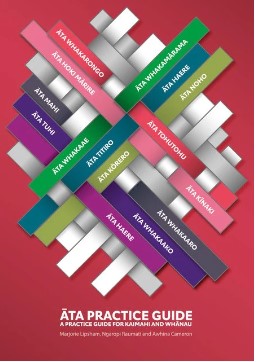Ata Practice Guide : A Practice Guide for Kaimahi and Whanau
- Unit price
- / per
-
Author:Marjorie Lipsham / Ngaropi Raumati / Awhina Cameron
-
ISBN:9781991162649
-
Publication Date:July 2024
-
Edition:1
-
Pages:100
-
Binding:Paperback
-
Publisher:Tu Tama Wahine o Taranaki
-
Country of Publication:New Zealand


A Back Order button means that we don’t have the book in stock at our store. It may already be on order – or we can order it for you from a publisher or distributor at no additional cost.
As we source items from around the globe, a back-order can take anywhere from 5 days to several weeks to arrive, depending on the title.
To check how long this might take, you’re welcome to contact us and we can provide an ETA or any other information you need. We recommend checking the timeframe before committing to an online order.
Ata Practice Guide : A Practice Guide for Kaimahi and Whanau
- Unit price
- / per
-
Author:Marjorie Lipsham / Ngaropi Raumati / Awhina Cameron
-
ISBN:9781991162649
-
Publication Date:July 2024
-
Edition:1
-
Pages:100
-
Binding:Paperback
-
Publisher:Tu Tama Wahine o Taranaki
-
Country of Publication:New Zealand
Description
Ata was initially formulated as a social work practice model by Taina Pohatu (2004) and focuses on respectful relationships, negotiating boundaries and creating ahurutanga (safety of space). Pohatu (2004) explains that the Ata framework was designed and developed using songs, chants and conversational Maori. There are 13 Ata phrases described by Pohatu and his definitions for these are shown and referenced throughout this practice guide.
Ata is both theory and practice. Each ata requires active participation, practice and application.
Ata is not only about beliefs or knowledge, it is a way to process, critically analyse, organise, and frame our behaviour within relationships. This guide has been designed as user-friendly and can be accessed and utilised by whanau themselves.
Adding product to your cart
You may also like
A Back Order button means that we don’t have the book in stock at our store. It may already be on order – or we can order it for you from a publisher or distributor at no additional cost.
As we source items from around the globe, a back-order can take anywhere from 5 days to several weeks to arrive, depending on the title.
To check how long this might take, you’re welcome to contact us and we can provide an ETA or any other information you need. We recommend checking the timeframe before committing to an online order.
You may also like
You may also like
-
Ata was initially formulated as a social work practice model by Taina Pohatu (2004) and focuses on respectful relationships, negotiating boundaries and creating ahurutanga (safety of space). Pohatu (2004) explains that the Ata framework was designed and developed using songs, chants and conversational Maori. There are 13 Ata phrases described by Pohatu and his definitions for these are shown and referenced throughout this practice guide.
Ata is both theory and practice. Each ata requires active participation, practice and application.
Ata is not only about beliefs or knowledge, it is a way to process, critically analyse, organise, and frame our behaviour within relationships. This guide has been designed as user-friendly and can be accessed and utilised by whanau themselves.
-
-
Author: Marjorie Lipsham / Ngaropi Raumati / Awhina CameronISBN: 9781991162649Publication Date: July 2024Edition: 1Pages: 100Binding: PaperbackPublisher: Tu Tama Wahine o TaranakiCountry of Publication: New Zealand
Ata was initially formulated as a social work practice model by Taina Pohatu (2004) and focuses on respectful relationships, negotiating boundaries and creating ahurutanga (safety of space). Pohatu (2004) explains that the Ata framework was designed and developed using songs, chants and conversational Maori. There are 13 Ata phrases described by Pohatu and his definitions for these are shown and referenced throughout this practice guide.
Ata is both theory and practice. Each ata requires active participation, practice and application.
Ata is not only about beliefs or knowledge, it is a way to process, critically analyse, organise, and frame our behaviour within relationships. This guide has been designed as user-friendly and can be accessed and utilised by whanau themselves.
-
Author: Marjorie Lipsham / Ngaropi Raumati / Awhina CameronISBN: 9781991162649Publication Date: July 2024Edition: 1Pages: 100Binding: PaperbackPublisher: Tu Tama Wahine o TaranakiCountry of Publication: New Zealand
-



